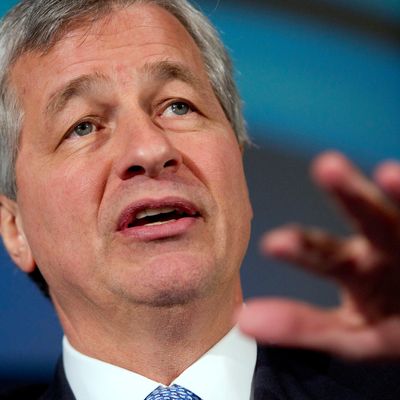
You could say he kind of asked for it. JPMorgan CEO Jamie Dimon’s celestial glow, acquired after the financial crisis, has been steadily dimming for some time — not only because the gallant gesture he made by buying Bear Stearns and Washington Mutual with government assistance turned out to be more-than-sweet deal for his firm, but because ever since, Dimon has been steadily nibbling at the hand that fed him. Over the past few years, the JPMorgan CEO leveraged his position as America’s Least-Hated Banker to become a vocal critic of attempts to rein in Wall Street, and no one who has stood in his way has been spared: Not Tim Geithner, the treasury secretary Dimon calls “Timmy,” who helped orchestrate those last-minute deals; not Fed Chairman Ben Bernanke, whose policies have allowed JPMorgan to borrow billions at absurdly low interest rates, and who Dimon recently ambushed with the suggestion he didn’t know what he was doing; not the “overpaid journalists” who express skepticism at his desire to do what he wants with impunity; and especially not President Obama, whom he has childishly accused of “unfairly” expecting bankers “to just bend over and take it.”
It was always a precarious position to take: The tall nail gets the hammer and all that. But Dimon’s announcement that JPMorgan lost $2 billion doing precisely the sort of trades he has insisted the government need not regulate, dropped into the middle of a deadly slow news cycle, was like dropping a lit match onto a pile of banknotes. Twitter immediately lit up with what CNN’s Lizzie O’Leary coined as Dimonfreude, from journalists and policy wonks alike. “Can we now finally acknowledge that Jamie Dimon is not smarter than any of the other Wall Street CEOs?” tweeted former TARP inspector Neil Barofsky. Forbes likened him to Darth Vader. MIT economist Simon Johnson was the first to make the recommendation Dimon resign. (Unlikely: After all, this isn’t Dimon’s first time at the billions-in-losses rodeo.) As Dimon predicted, the punditocracy leapt at the chance to call for more regulation: “If the regulators do what the law says, this activity would not be permitted,” Senator Carl Levin of the Permanent Subcommittee on Investigations told CNBC, and Barney Frank issued a tart statement: “In other words, JPMorgan Chase, entirely without any help from the government has lost, in this one set of transactions, five times the amount they claim financial regulation is costing them,” he said.
This afternoon, the SEC, always slightly late to the party, announced its intent to investigate the trades. But through the din, a note of support rang out from an unexpected place: “No real Dimonfreude here,” says an executive at Goldman Sachs, JPMorgan’s perennial rival. “It’s been good having him out there,” the person added. “He’s kind of been saying things none of us could say.” Meanwhile, Doug Kass, a hedge-fund manager and columnist at The Street, announced his intention to “take a small long position” in JPMorgan. There you have it: He may no longer be America’s favorite banker, but he’s still Wall Street’s.





























